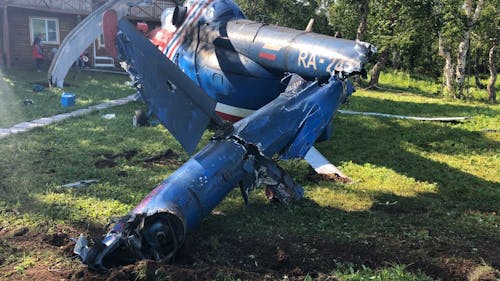Rutgers professor survives helicopter crash, helps injured passengers

Dr. Konstantin Balashov, a professor of neurology at Rutgers Robert Wood Johnson Medical School, was a passenger in the Mil Mi-8 helicopter that crash-landed on Russia’s remote Kamchatka peninsula.
On Aug. 13, a Mil Mi-8 helicopter carrying 23 tourists crash-landed on Russia’s remote Kamchatka peninsula. One of the passengers was Dr. Konstantin Balashov, a professor of neurology at Rutgers Robert Wood Johnson Medical School.
Balashov, as the only physician on board, provided emergency medical aid to the injured passengers and prevented a potentially severe disability for one, according to a recent press release.
“In Russia there are places that are internationally known like Lake Baical, Moscow and St. Petersburg. And there is this place called Kamchatka, which is a peninsula close to Japan,” Balashov said.
The Kamchatka peninsula is famous for volcanoes and fishing spots, he said. Balashov, who moved to the United States from Russia when he was 31, said he decided to visit the peninsula to see a part of Russia he had not seen before.
Planning was crucial for the trip, he said.
“You want to know what’s going to happen,” Balashov said. “You make certain you have a schedule. If you plan, everything goes smooth. If you don’t plan, it can be a disaster.”
The helicopter had already made two landings and as it was about to land a third time, it started to tip backward, he said.
“As the tail of the helicopter hit the ground, the propeller got cut off. This caused the helicopter to start rotating and the force threw people to the back of the helicopter," Balashov said.
Balashov was sitting under a metal rod and when he saw people being thrown back, he said he decided to grab the metal rod.
“When I started to see people being thrown backward, I looked at my hand and the rod, and everything was moving fast but it felt like it was happening in slow motion, and I had this idea,” he said. “So, I grabbed it and stayed in place.”
After hitting a few trees, the helicopters main propeller was cut off and it finally landed, Balashov said.
“First you look around: Okay, you’re alive. Great. Then you think, okay no one will believe you, so you start taking pictures. Then you see that a couple of people are sitting and there’s something wrong with them,” he said.
Balashov went on to address three injuries, two of which were a tibial fracture and a cervical fracture that could have led to paralysis. To immobilize the injured passengers, Balashov said he used nearby planks of wood and a saw he borrowed from a local.
Eventually, a medical helicopter came to take the patients to a hospital, he said. While the rest of the passengers waited for another helicopter, Balashov went fishing.
“I looked around and there wasn’t much to do. I went around and found a fishing rod. Out of 10 fishing rods in the back of the helicopter, I found one that wasn’t broken. I went to the river and I got to fish,” he said. “A bear eventually came to the other side of the river, so I started to feel uncomfortable and left.”
Balashov said the ability to stay calm is something all physicians gain from residency. As a resident, you do not have time to Google or ask someone else what to do in the case of an emergency, he said.
“You often don’t have time to sleep and in the middle of the night several nurses will call you. This guy has loss of consciousness, that guy is complaining of pain,” he said. “Based on very small amount of information, you have to define priorities. You develop a sixth sense for where to go and how fast.”
Balashov said he often sees this transformation in his own medical students.
“You see a guy who is nervous and relatively naïve at first. After two years of residency, you gain confidence in him and think he’s ready to practice," he said.
Balashov has not told his students about the helicopter crash and said he does not like to think of himself as a hero.
“A hero is someone like a firefighter who will risk his life. I didn’t risk my life, I was just helping people. What were the options? Not doing anything?” he said. “But it’s inside a physician, you cannot be a physician if you don’t want to help.”
He said the helicopter crash paled in comparison to having to tell a young patient that they had unexpectedly found cancer in her MRI scan, as he has done at his usual medical job.
“With this helicopter crash, you can work at the level of a robot. Everyone is alive and these things happen. You kind of expect this to happen from time to time. You are more unhappy when things happen in ways you don’t expect,” Balashov said.
He said that regardless of risk, it is great to be able to travel to remote places to appreciate the environment and life in the United States.
“You don’t want to spend all 12 months a year in a lab or studying. You need to have a break and you don’t want to spend this break going to an all-inclusive resort,” he said. “It’s a privilege to live in the United States. Unfortunately, we think that many things we have are supposed to be this way, and they don’t. You don’t understand that unless you travel.”



